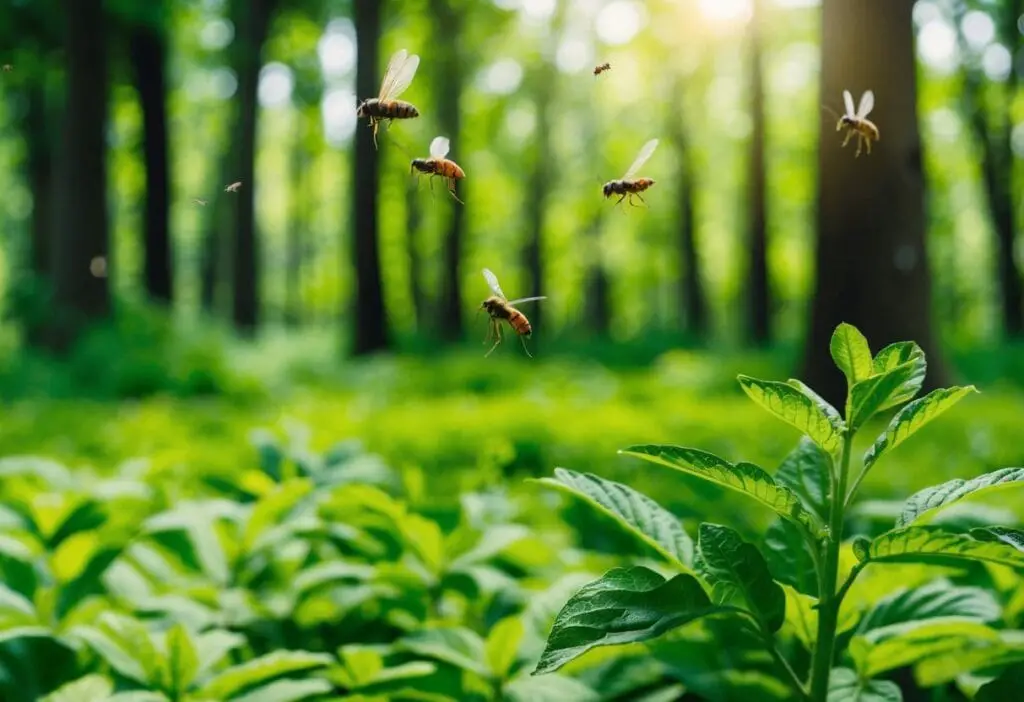Dealing with unwanted insects can be frustrating.
Many people try commercial insect repellents, often with limited success.
There are several natural homemade solutions that help remove pests without harsh chemicals.
Here are effective approaches for managing ten common types of insects, using non-toxic ingredients that you can easily find or make at home.
Table of Contents
1. Ticks
Mix 4 tablespoons of olive oil with ¼ teaspoon of geranium bourbon essential oil in a spray bottle.
Shake well and apply it to pets, focusing on their body and feet to keep ticks away.
2. Spiders
Mix 15 drops of peppermint essential oil with 250 ml of water and ¼ teaspoon of dish soap.
Pour the solution into a spray bottle and treat affected areas once or twice a week.
The peppermint scent deters spiders.
Tip: Place small pouches filled with dried herbs like rosemary or mint around the home.
These herbs help repel spiders.
3. Ants
Method 1: Combine 20 ml of liquid hand soap with 1½ cups of water.
Pour the mixture into a spray bottle and apply it directly to ants.
Method 2: Mix equal parts white vinegar and water, then add a few drops of peppermint and cinnamon essential oils.
If you have pets, use 2 teaspoons of cinnamon powder instead of oil.
The vinegar solution disrupts ant trails and acts as a repellent.
4. Flies
Add 1 cup of water and ¼ teaspoon of lemongrass essential oil to a spray bottle.
Spray kitchen surfaces where flies gather.
You can also place a sponge soaked in lavender essential oil inside a jar.
Close the lid and open it outdoors to help manage flies during meals.
5. Cockroaches
Method 1: Blend 1 cup of water with 6 to 8 drops of rosemary essential oil and 8 to 10 drops of peppermint oil.
Strain the solution into a spray bottle and target cockroach-infested areas.
Method 2: Combine 1 cup of water, ½ tablespoon of clove powder, 2 tablespoons of borax, ½ cup of vinegar, and 1 tablespoon of baking soda.
Spray this mixture in problem areas to keep cockroaches away.
Make a dust of equal parts borax and sugar with a few drops of tea tree essential oil.
Sprinkle the mix near entry points.
Add a bit of cocoa powder to attract cockroaches to the trap.
6. Mosquitoes
Mix ¼ cup of water with 2 tablespoons of witch hazel and 10 drops each of lemongrass and citronella essential oils.
Apply the solution on clothing to discourage mosquito bites.
Mosquitoes dislike these essential oil scents.
Caution: Always dilute essential oils with water before use.
Avoid direct application on the skin to prevent irritation.
7. Bees
Combine 1 tablespoon of water with 1 tablespoon of peppermint essential oil.
Use this mixture on arms and ankles to avoid bee stings during outdoor activities.
8. Fruit Flies
Fill a small jar with apple cider vinegar and cover it tightly with plastic wrap.
Poke small holes in the wrap with a toothpick.
Fruit flies enter through the holes and cannot escape.
9. Moths
Moths dislike strong scents.
Make sachets filled with cinnamon, peppercorns, and cloves to keep moths away from clothing in cabinets and pantries.
10. Fleas
Mix equal parts apple cider vinegar and water in a spray bottle.
Apply the solution to areas where fleas are present.
11. Deterring Cats
Lavender, peppermint, pennyroyal, and lemongrass repel cats.
Plant these herbs in the garden to keep cats away.
Frequently Asked Questions

How can a person create a homemade mosquito repellent that is effective?
Mix carrier oils like coconut or olive oil with essential oils known for repelling bugs.
Common essential oils include citronella, eucalyptus, and lavender.
Add 10-20 drops of essential oil per 2 tablespoons of carrier oil.
Apply this mixture to the skin to help keep mosquitoes away.
What are some of the best natural ingredients for personal mosquito repellent?
Several natural ingredients work well against mosquitoes.
Some of the most popular include:
- Citronella oil: Its strong scent repels insects.
- Lemon eucalyptus oil: Works as well as DEET.
- Lavender oil: Offers a pleasant aroma and pest-repelling qualities.
- Peppermint oil: Deters bugs with its strong smell.
- Tea tree oil: Has antibacterial properties and repels bugs.
What natural methods can one use to repel mosquitoes and bugs?
There are various simple methods for repelling insects naturally.
Some options are:
- Essential oil sprays: Mix water and essential oils in a spray bottle for a refreshing repellent.
- Herb sachets: Place dried herbs like mint or rosemary in small pouches to deter bugs.
- Candles: Burn citronella candles outdoors to help create a bug-free zone.
- Plants: Grow mosquito-repelling plants such as marigolds or basil near entrances.
How can someone make an indoor natural insect repellent?
Use essential oils in diffusers or create a spray by mixing water with oils like lavender or peppermint.
Spray it in corners or entry areas.
Regularly clean areas to remove anything that attracts insects.
Which natural insect repellent is most effective for outdoor spaces?
Some natural repellents work better outdoors.
Options include:
- Citronella oil: Widely used for outdoor protection.
- Lemon eucalyptus oil: Proven to repel mosquitoes outside.
- Neem oil: A natural pesticide that repels various insects.
Are there any natural fragrances that are known to keep mosquitoes away?
Yes, various scents can deter mosquitoes.
- Lavender: This calming scent repels insects.
- Peppermint: Its strong aroma keeps mosquitoes away.
- Lemongrass: It contains citronella, which repels bugs.
You can use these natural scents as essential oils or candles to create a pleasant environment and keep bugs away.

